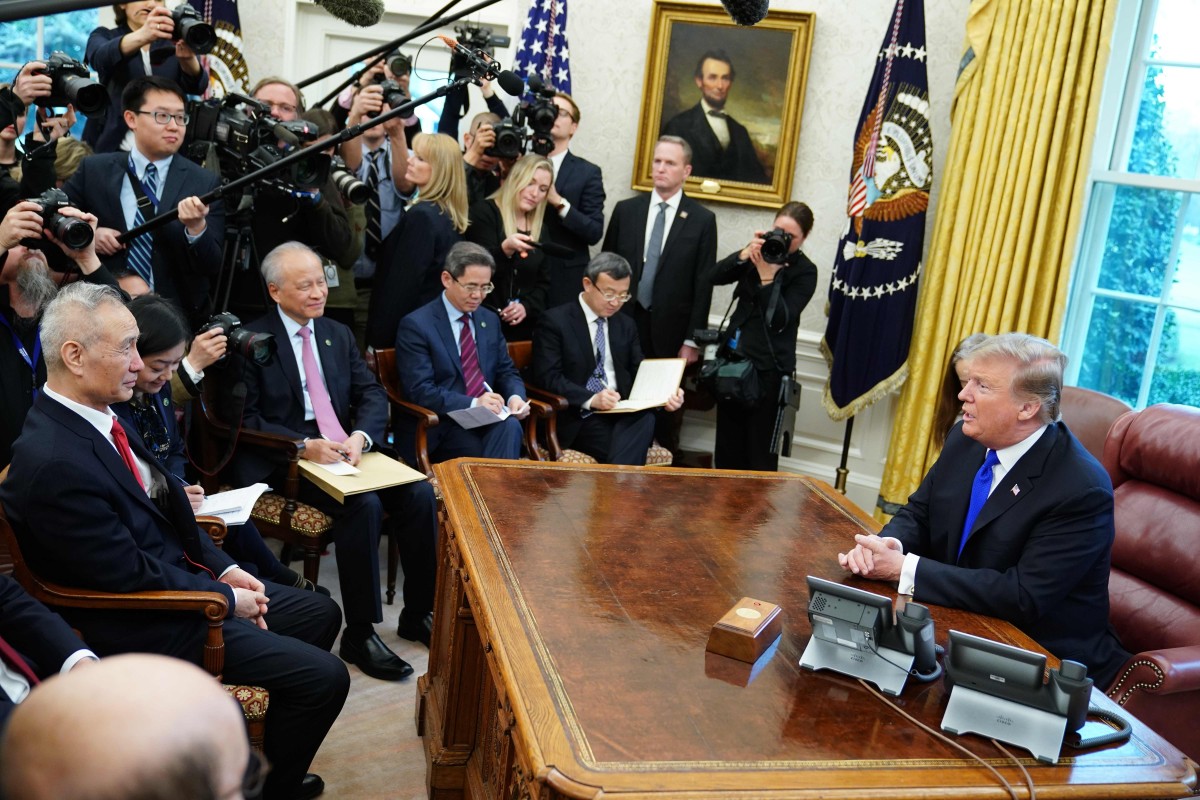Xie Yu
US President Donald Trump meeting a delegation of Chinese trade envoys led by vice-premier Liu He in the Oval Office on February 22, 2019. Photo: AFP
China’s government, locked in disputes with the nation’s biggest export market, was playing the long game and waiting to see who “blinks first” when a trade war between the world’s two largest economies spiralled out of control last year, a former adviser to the Chinese central bank said.
Negotiations to resolve the disputes went into a six-month hiatus due to several false starts caused by lack of understanding, said Tsinghua University’s economics professor David Li Daokui, a former member of the monetary policy committee of the People’s Bank of China.
“China was patient, and was not eager to reach a deal in [the period between] May and November” last year, Li said at Credit Suisse’s Asia Investment Conference in Hong Kong, recounting a December 2018 phone call with the Chinese head of state Xi Jinping. “Let’s see who blinks first,” he recalled Xi as saying.
The episode underscores the mistrust – and lack of understanding – between the two nations, where a year-long series of tit-for-tat disputes over import tariffs, technology and trade policies have roiled global markets, stifled investments and crimped growth.
Talks between the two nations – with US$630 billion of commerce between them last year – were halted for six months in 2018 after a team led by US Treasury Secretary Steven Mnuchin left Beijing empty-handed in May.
Li does not mince his words when it comes to US trade negotiators. The American trade envoys, especially US Trade Representative Robert Lighthizer, was a “team of barking dogs” who were “perceived to be overly aggressive, unnecessarily aggressive by the Chinese general public,” he said.
“You have to show respect. Otherwise it does not work,” Li said.
The US fired its first salvo in July and August last year after the breakdown in talks, slapping 25 per cent import tariffs on US$50 billion of Chinese goods in two tranches, followed by a 10 per cent tariff on US$200 billion of Chinese products.
That was followed in kind by China imposing tariffs of between 5 per cent and 25 per cent on US$110 billion of American imports, effective July and August.
Then came the US threat to raise the import tax to 25 per cent on Chinese goods from January 1, a deadline that was extendedonly after US President Donald Trump met his Chinese counterpart in Buenos Aires on December 1.
To build trust, Beijing and Washington DC should set up monitoring mechanisms and a protocol for regular dialogue to keep track of the commitments for resolving the trade dispute, Li said, adding that there is a “good chance” for such a clause to be written into the final agreement between the governments.
“We need to have month-to-month talk, or even every two weeks, to make sure the US understands things” correctly, he said. “For example, China is not devaluing the currency for export competitiveness.”
To be sure, the two governments have had a series of twice-annual talks since 2006 during the administrations of George W. Bush and his counterpart Hu Jintao. The US-China Strategic Economic Dialogue (SED) was broadened to become the US-China Strategic and Economic Dialogue in 2009 during the Obama administration. The talks were renamed the
Comprehensive Economic Dialogue (CED) in April 2017 by Trump and Xi.
However, the trade war has shifted since December 1 from tariffs to issues such as allegations of China’s theft of US industrial technology, charges of espionage and individual cases such as the troubles faced by Huawei Technologies and its chief financial officer.
“If this happens, China will not apply to join” like it did with its 2000 membership in the WTO, Li said. “China is now the world’s largest exporter and importer, even if the US economy is larger in size. China can set up its own WTO.”
In many ways, the Chinese government had already anticipated all of this.
“We are prepared for this new president to create trouble,” Li said, recounting comments by the Chinese president in a small-group discussion shortly before Trump’s inauguration in January 2017. “He is new, from outside political institutions. He does not believe in a lot of things. He will try, but he will be burnt.”

No comments:
Post a Comment